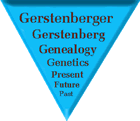

Written by Mayor Theo Hesselbarth, translated by Dietmar Boehme, translation edited by Naj Wikoff
(Written for the 2002 World Wide Gerstenberger Reunion in Gerstenberg, GE., and first appearing on Arnt Gerstenberger's Website, www.gerstenberger.com.)
Gerstenberg is the only place in Germany, Europe and perhaps in the world so named. Our village is situated in the cheerful valley of the brook Gerstenbach, just above its junction with the river Pleiße. Five kilometres to the north is the thousand year old, formerly free imperial and residence city, and present district town of Altenburg. Gerstenberg is located in Thuringia, 45 kilometres south of Leipzig. The Gerstenberg community consists of two hamlets, Gerstenberg and Pöschwitz, 313 hectars in size with 593 inhabitants (2003). The valley of the Gerstenbach forms the natural borders. This fertile valley was created in the last glacial period, approximately 10,000 years ago that came down from Scandinavia. A striking natural feature is the Kirchberg, a little mountain "peak", where sits the little chapel, the landmark of the village, called Michaeliskapelle visible from far away. Below the Kirchberg is the old commercial street Peter Paul. In the Middle Ages, products, such as salt and amber from North and Central Germany, were transported along this street on their way to Bohemia, South Germany, and Italy. Long before the first documented account of the village in 1227 a little Slav settlement existed. Germans first settled the community about 1050. The ruler, von Raben, made a manor out of the old Slav ring layout which was continued by the ruler von Gerstenberg and his descendents. Indeed it is the presence of the von Gerstenbergs that the village was documented. The von Gerstenbergs lived in the community until 1450, but have not since. However, all people with this surname did have their roots in our village. Following the departure of the von Gerstenbergs the manor was distributed and moved to Pöschwitz. This manor still exists, but must be demolished in the next few years. At the site of the Slav settlement a little Christian chapel was created around 1100, consecrated as the Holy Michael, and enlarged in 1472. After the reformation by Martin Luther the chapel became a Lutheran church. In 1843 a silver treasure with more than 800 coins from the 12th century was found in the ground. The chapel is the oldest building in Gerstenberg, is listed as a historical monument, and is still an active church. Nearly as old as the chapel is our inn. It was first mentioned in 1349 then as big farm. For over 400 years the family Kirmse owned and operated the inn. Another old building is the water mill. It was operated for hundreds of years until 1983 and only switched to electricity for its last twenty-five years. Our schoolhouse was built in and used since 1661, only just closing in 1993. For most of its history, residents of Gerstenberg have worked in agriculture. However, since 1900 most residents worked in the brown coal or other factories in Altenburg. Currently village residents are facing high unemployment. For the past 124 years the village has had a fire brigade. We also have a sports club, a rabbit club and an allotment club. Famous women and men were not produced in our village. But we didn't produce big criminals either. Most of our inhabitants were simple, honest and respectable persons. The village has survived all the times of knights, dukes, emperors and kings, Hitler and Stalin fairly well and largely unharmed. The biggest interferences in our peaceful lives have been created by wars. The war from 1618 to 1648 decimated the inhabitants - only half of them survived. The war from 1756 to 1763, the Napoleon war from 1806 to 1815, the war against France 1870/71, the First World War and, to the greatest degree, the Second World War brought tremendous changes. For us the last war ended with the marching in of the US Army in April 1945. Now we are able to look back on a period without war of 58 years. We should think about this, and be grateful and do all we can to insure no wars are started in the future I wish the Second International gathering in Lake Placid a lot of success, a lot of participants and a lot of pleasure. Kind regards from our major Theo Hesselbarth |